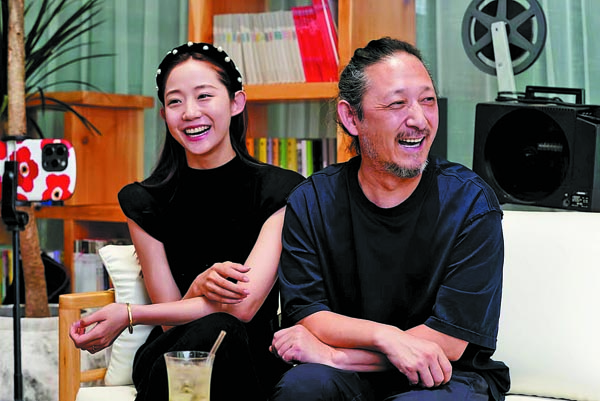

According to Wan, who is also the producer of San Bao's concerts, the idea of highlighting the composer's pieces written for musicals came from a concert he had in 2021 in Shanghai, along with musical director Li Dun.
The concert, titled Flying Apsaras, was inspired by Li's visit to murals in Dunhuang, Northwest China's Gansu province. With a live band and a 60-member chorus, as well as musical singers, such as Liu Yan and Ayanga, San Bao premiered 14 new songs.
"When I prepared the song list for the concerts, it was very difficult," says San Bao. For audiences who have watched his musicals, the composer selected songs for them that would instantly bring them back to the particular musicals they've watched. For those who never watched his musicals or any musical, he hopes that the concerts will offer them a glimpse of musicals, "an art form which is still at its infancy" in China.
Born in Hohhot, Inner Mongolia autonomous region, into an ethnic Mongolian family, San Bao learned to play the violin and piano as a child. His mother, Xin Huguang, was also a composer, who was known for her symphonic poem, Gada Meiren, which, released in 1956, was inspired by a well-known Mongolian folk song with the same name.
At 13, he came to Beijing to study violin at the middle school affiliated to the Minzu University of China. In 1986, San Bao was enrolled for conducting at the Central Conservatory of Music in Beijing, where the classically trained musician fell in love with composition and started to write pop songs. He has written hits for pop singers, such as Liu Huan, Mao Amin, Sun Nan and Na Ying during the 1990s.
"Everybody knows San Bao for his songs, largely thanks to the songs he wrote for pop singers, but those songs only show a very small part of his talent. Musicals really show his power as a songwriter," says Sha.
He says when he composes for musicals, he starts by reading the scripts over and over again because there are four tones in Mandarin, which make each line rhythmic even without music.
"It usually takes me a very long time to read the scripts and understand the rhythm of each word before I actually start to compose," says San Bao. "Once I am done with the preparation, which is like a warmup, I compose songs very efficiently. It is all music. I work from noontime till midnight without having any food or distraction.
"Of course, for musicals, a good story is the most important thing. That's what gets my compositional ideas flowing," he adds.
In 1995, the Beijing-based Central Academy of Drama and the Beijing Dance Academy both launched musical majors. This was the first time that Chinese universities trained professional musical performers. The fledgling industry saw rising popularity among the country's young audiences with classic Western musical productions touring Chinese cities, such as Cats and The Phantom of the Opera.
From Chinese producers staging Mandarin productions of popular Western shows to creating original Chinese musicals, the country's appetite for musicals has been growing.
However, San Bao laments that, although the country's musical market is growing, with several musical actors rising to fame and gaining a large fan base, the market still needs young talent.
"Three core elements-acting, singing and dancing-make a musical successful. But it's not easy to find all-around performers. It still takes a long time (to find and train good performers)," he says.